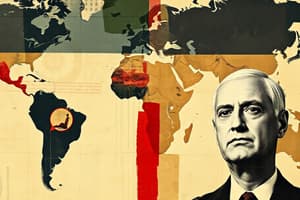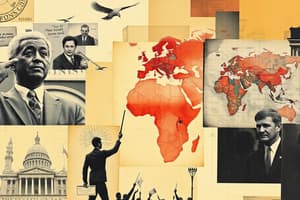Podcast
Questions and Answers
What is the main goal of global citizenship education?
What is the main goal of global citizenship education?
- To impose a specific cultural viewpoint on others.
- To promote international involvement and social justice. (correct)
- To prioritize national issues over global concerns.
- To eliminate cultural differences completely.
How do global value chains impact international trade?
How do global value chains impact international trade?
- They connect various stages of production internationally through trade. (correct)
- They create isolated production practices within countries.
- They reduce the quality of products due to global standardization.
- They discourage investment relationships between nations.
What does trade liberalization aim to achieve?
What does trade liberalization aim to achieve?
- Enhancement of local production isolation.
- Stricter quotas on imports and exports.
- Increased tariffs on international goods.
- The removal of restrictions on global trade. (correct)
What is a consequence of cultural convergence?
What is a consequence of cultural convergence?
What role does regionalism play in global relations?
What role does regionalism play in global relations?
What does the concept of skill mismatch refer to in the context of globalization?
What does the concept of skill mismatch refer to in the context of globalization?
How does global commons influence global governance?
How does global commons influence global governance?
What is one significant benefit of advancements in access to medical technologies?
What is one significant benefit of advancements in access to medical technologies?
What does globalization primarily refer to?
What does globalization primarily refer to?
What is a potential negative effect of brain drain?
What is a potential negative effect of brain drain?
Which aspect of globalization describes the growing influence of financial motives?
Which aspect of globalization describes the growing influence of financial motives?
Which factor enhances global interconnectedness according to the content?
Which factor enhances global interconnectedness according to the content?
What role do international organizations play in the context of globalization?
What role do international organizations play in the context of globalization?
How has globalization affected language acquisition?
How has globalization affected language acquisition?
Which of the following best describes cultural globalization?
Which of the following best describes cultural globalization?
What is the effect of technological innovations on trade?
What is the effect of technological innovations on trade?
Flashcards are hidden until you start studying
Study Notes
Globalization
- Globalization is the worldwide interconnection of nations, communities, and economies.
- Key elements include political interdependence, technical progress, cultural interchange, and economic integration.
Power Dynamics
- Power dynamics influence the global interstate system, shaping alliances, conflicts, and geopolitical balances.
Brain Drain
- Globalization facilitates migration, leading to a brain drain where highly educated individuals leave their home countries.
- This migration can worsen skill shortages and hinder economic growth in their origin nations.
Financialization
- Financialization denotes the rising impact of financial markets and motives on domestic and international economies.
Technological Innovations
- Developments in technology eliminate geographical barriers, allowing for instantaneous communication and transactions globally.
- Innovations enhance efficiency, lower transaction costs, and expand market access for businesses.
Political Interdependence
- International organizations and agreements arise from globalization to address issues like trade disputes, terrorism, and climate change.
Cultural Exchange
- Cultural globalization enables the sharing of beliefs, customs, and ideas, fostering diversity in languages, music, art, and cuisines.
- Education plays a crucial role in promoting linguistic proficiency and cross-cultural communication, enhancing understanding and tolerance.
Global Citizenship Education
- Education on global citizenship encourages involvement in international affairs, advocacy for social justice, and engagement with global issues like poverty and environmental sustainability.
Global Value Chains
- Global value chains refer to the distribution of production processes across different countries, establishing interconnected trade and investment relationships.
Regionalism vs. Globalism
- Regionalism focuses on cooperation within specific geographic areas, while globalism advocates for broader collaboration to tackle transnational challenges.
Internationalism
- Internationalism emphasizes political, economic, and cultural cooperation among nations for peace, environmental protection, and aiding underdeveloped countries.
Trade Liberalization
- Trade liberalization involves reducing barriers to international trade (tariffs, quotas) to encourage free exchange of goods and services.
Global Commons
- Shared resources (atmosphere, oceans, outer space) necessitate collective action and cooperation for sustainable management and governance.
Access to Medical Technologies
- Advancements in telemedicine, surgical methods, and medical imaging enhance healthcare access for underserved populations.
Economic Integration
- Companies seeking economic integration must expand their global supply networks and partnerships.
Skill Mismatch
- Rapid globalization results in skill mismatches in the labor market, necessitating investment in training and development programs.
Globalized Education
- Increased cross-border mobility of researchers and students contributes to globalized education.
- Collaborative research, international exchanges, and transnational initiatives facilitate knowledge creation and global educational practices.
Security Challenges
- Security challenges influence states' foreign policies and the global interstate system.
Studying That Suits You
Use AI to generate personalized quizzes and flashcards to suit your learning preferences.




